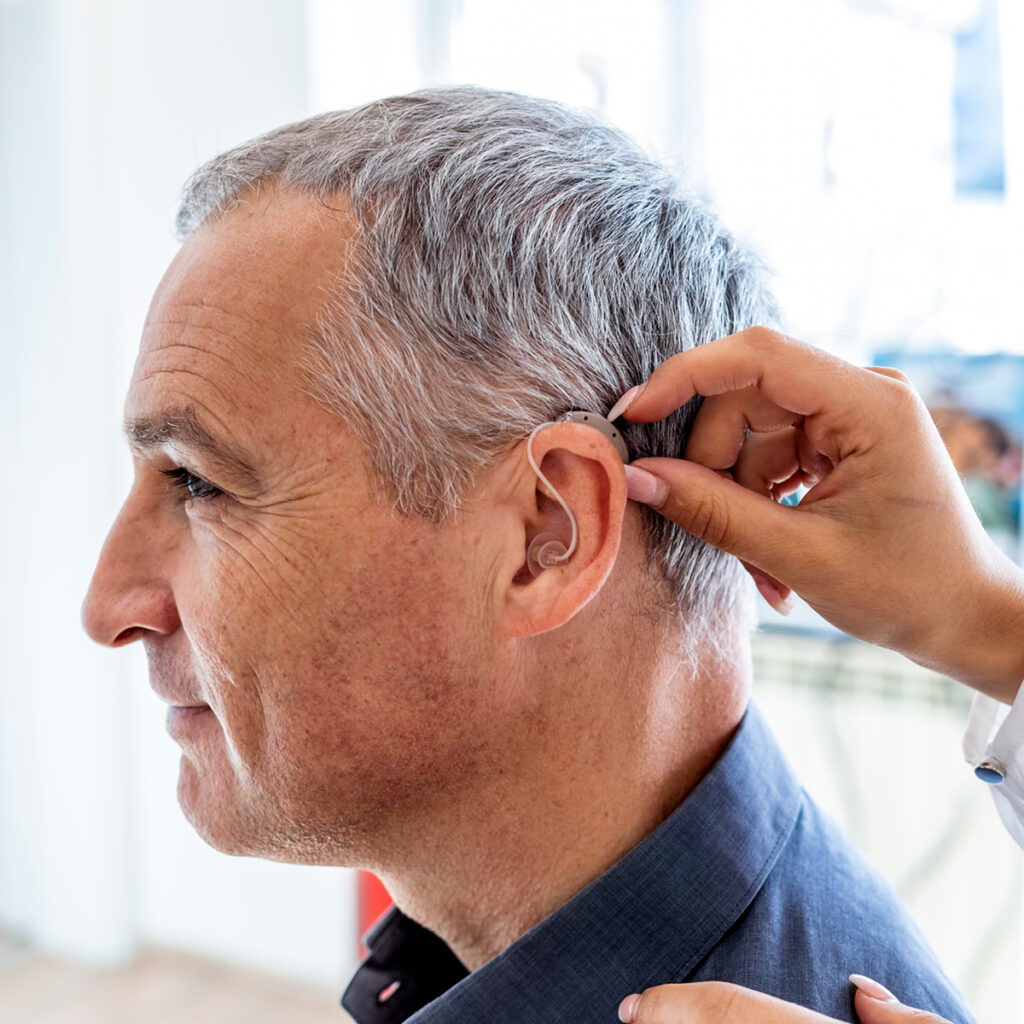This article was written by Candy McGinnis, Au.D., a HearingLoss.com®-Certified provider at Fox Valley Hearing Center in Oshkosh, Neenah, Appleton, and Ripon, Wisconsin.
With big-box stores like Costco and even online retailers staking a claim in the hearing aid market, the options can seem overwhelming. But while retail chains may promote lower upfront prices with off-the-shelf devices, it’s essential to look beyond the price tag to understand what truly delivers lasting results.
The right provider can mean the difference between a hearing aid that ends up abandoned in a drawer and one that transforms your daily life. Here’s how professional hearing evaluations, prescription hearing technology, and ongoing care with a HearingLoss.com-Certified practice can deliver the long-term value that a low-cost, one-size-fits-all solution can’t match.
Where to Buy Hearing Aids — Understanding Your Options
Today’s hearing aid market includes three main channels. Each serves different needs, but only one consistently delivers the combination of diagnostic testing, precise fittings, and ongoing support critical for long-term hearing success and satisfaction.

- Big-Box Retailers
These stores attract buyers with lower upfront prices and convenience. They often carry a limited selection from contracted manufacturers, including OTC and prescription-level devices. Many devices are “locked” to the store’s service system, and staff are generally dispensers, not audiologists, which can limit flexibility and long-term care. - Online and Direct-to-Consumer Sellers
Online sellers primarily offer OTC devices, designed for adults with perceived mild to moderate hearing loss. These devices provide some amplification but lack in-person evaluation and, potentially, personalized fitting. Without professional oversight, medical issues may go undetected, and real-world performance, like in noisy environments, may prove inconsistent. - Independent Hearing Care Professionals
HearingLoss.com®-Certified practices provide comprehensive care from the start, including full diagnostic testing to identify hearing loss and medical concerns. They access multiple manufacturers and technology levels, deliver real-ear measurements, precision fittings, counseling, and ongoing follow-ups. This tailored, long-term approach consistently delivers superior results compared with other routes.
Hearing aids are medical devices meant to treat a serious, chronic condition. Big box and online options may provide convenience and short-term cost savings, but lasting success depends on the expertise, personalization, and ongoing support that independent hearing care professionals deliver. Their approach ensures every device performs optimally for years to come.

Hearing Aids Are More Than Devices — They’re a Connection Back to Life’s Meaningful Moments
Hearing care is more than choosing a device, it’s choosing a professional who understands your unique hearing needs and helps you rediscover the joy of connection in every moment that matters.
Why Hearing Aids From Big Box Stores Are Often Cheaper
Big-box stores may offer lower hearing aid prices through bulk purchasing and negotiated models, often with a more limited selection of brands. Staff may be limited in capabilities, able to perform only some assessments and fittings. Complex ear or hearing disorders or potentially related issues such as tinnitus or dizziness may be beyond their scope.
Licensed audiologists can diagnose complex hearing and ear disorders, providing evidence-based treatment plans. Patients with more intensive needs, uncertain diagnoses, or severe hearing difficulties may benefit from the advanced expertise at independent hearing care clinics.
Hidden Drawbacks of Buying Hearing Aids at Big Box Stores
While lower cost can be attractive, there are trade-offs. Some of the most common disadvantages of big-box hearing instruments may include:
- Locked devices — Many retail-sold hearing aids are “locked,” meaning only that retailer can adjust or service them. If you move, travel, or become dissatisfied with care, your options may be limited.
- Narrow product choice — With selection potentially based on contracts, you may be fit with a “middle-of-the-road” model rather than the latest technology that best matches your lifestyle.
- Limited insurance acceptance — Some won’t accept or bill your insurance, even if you have hearing aid coverage.
- Potential dissatisfaction — Most first-time buyers (75-80%) reportedly don’t return to this big-box store for their next set of hearing aids, indicating a low customer-return rate.
How a Professional Hearing Evaluation Sets the Foundation for Better Results
Your hearing health is more than a quick screening. With a HearingLoss.com-Certified practice, an initial evaluation includes a comprehensive case history; otoscopic exam; pure-tone and speech testing; and, critically, speech-in-noise testing. This last measure simulates real-world challenges, such as following conversations in a busy restaurant.
Highly trained licensed providers are especially skilled at recognizing medical concerns that may require further evaluation, such as middle-ear disease or auditory processing disorders. Without a full evaluation, underlying conditions can easily be missed.

Ready to Find the Right Hearing Solution for Your Life?
Start with a comprehensive hearing evaluation from a Certified provider. Together, you’ll uncover the best hearing aid options to fit your needs, goals, and lifestyle.
The Importance of Proper Fit and Precise Programming

Your ear-canal shape, lifestyle, and listening needs are unique. Skipping proper hearing aid programming is like buying prescription glasses without having the lenses cut to your prescription.
Even the best hearing aid will underperform if it’s not properly fitted. Real-ear measurement (REM), a hearing aid verification that measures sound levels inside your ear canal, helps ensure your device delivers the right amplification for your listening profile. Research shows that REM leads to better speech understanding compared to fittings without it.
Big box retailers may not consistently offer REM. In fact, only 30% of hearing care providers regularly perform real-ear measurements. Working with a HearingLoss.com-Certified clinic provides peace of mind that your hearing health care team follows clinical and patient best practices, including this important verification.
Ongoing Support and Adjustments You Won’t Get From a Store Shelf
Hearing aids aren’t a one-time purchase; they’re part of a lifelong journey. Most people fitted with hearing technology may need a few adjustments in the first year alone. Independent audiology practices schedule follow-up visits, cleanings, firmware updates, and repairs. HearingLoss.com-Certified practices can be counted on for these core practices and more.
By comparison, Costco and other big-box stores may provide some follow-up appointments and adjustments, but they may not occur at the personalized level you expect. True success with hearing aids comes from service after the sale, not just the sale itself.
Prescription Hearing Aids vs OTC — Why Professional Care Matters
In 2022, the U.S. Food and Drug Administration established the category of over-the-counter instruments for adults with perceived mild-to-moderate hearing loss. While this expands access, it also creates confusion. OTC devices may seem appealing due to convenience and cost, but they’re not a substitute for professional evaluation and properly prescribed and fitted hearing aids.
Hearing loss in older adults is linked to risk of cognitive decline, social isolation, and depression. A professional audiologist ensures your device is not only fit correctly but also monitored over time for changes in hearing health.
How to Choose the Best Place to Buy Hearing Aids for Long-Term Success
When deciding where to buy hearing aids, ask yourself:
- Will I get a comprehensive hearing evaluation or just a quick screening?
- Are my devices locked to a store, or can I receive care anywhere?
- Does the provider offer real-ear measurement and precise fitting?
- What level of ongoing follow-up care is included?
- Will they help me navigate insurance benefits?
Your answers will likely lead you to an independent hearing care professional, and you can find one near you. Remember: Hearing aids aren’t gadgets. They’re powerful medical devices that require expertise to unlock their full potential.
Common Questions About Buying Hearing Aids
Why are hearing aids at big box stores cheaper?
They’re typically sold in bulk and limited to contracted models, which allows retailers to lower the upfront cost. However, these savings can come with fewer customization options and less ongoing support, which can reduce long-term satisfaction and success.
What are the disadvantages of buying hearing aids at big-box stores?
Devices from big box stores may be locked, meaning only that store can adjust or service them, which can limit flexibility if you move or travel. Service options are often limited, fittings may not be as precise, and some patients don’t return for a second pair.
Where is the best place to buy hearing aids for long-term results?
HearingLoss.com-Certified hearing care providers offer comprehensive evaluations, real-ear measurement, and ongoing support that ensure your devices perform their best. This level of personalized care makes hearing care practices the best choice for people who want sustainable, long-term success with their hearing health.
What’s the difference between OTC and prescription hearing aids?
OTC devices can provide basic amplification for adults with perceived mild to moderate hearing loss, but they don’t include professional fitting, diagnosis, or medical oversight. Prescription hearing aids from a hearing care professional, by contrast, are tailored to your specific hearing profile and supported by ongoing adjustments and expert care.
Where can I get a hearing test?
A licensed hearing care expert is the most qualified professional to conduct a comprehensive hearing evaluation, including speech-in-noise testing and other advanced measures. They can also identify underlying medical concerns and guide you to the best solution for your lifestyle and long-term hearing health.
How HearingLoss.com Helps You Find Trusted Hearing Care Providers
If you’re exploring where to buy hearing aids, HearingLoss.com is here to help. You can start by taking our quick online hearing screener to see if you may benefit from a professional evaluation. In addition, our provider finder connects you with trusted hearing professionals in your area.
By partnering with hearing-care leaders like Fox Valley Hearing Center, you’re helping take care of your hearing health and overall wellness for the long term. You gain a partner dedicated to customizing every hearing plan, working with multiple hearing-tech innovators, and providing care that adapts as your needs change.
Whether it’s your first pair of hearing aids or your third, you deserve more than a sales transaction — you deserve expert, compassionate hearing care for life.
References
- Pros & Cons of Costco Hearing Aids. (2018). HearingUp. https://hearingup.com/videos/pros-cons-of-costco-hearing-aids. Accessed Sept. 11, 2025.
- Sanjay S et al. (2025). Comparison of Performance with Hearing Aid Programmed to First-Fit and Optimized Fit. 21(3):1–6. https://www.researchgate.net/publication/392032897_Comparison_of_Performance_with_Hearing_Aid_programmed_to_First-Fit_and_Optimized_Fit. Accessed Sept. 11, 2025.
- Audiology Today: ONLINE FEATURE | Real-Ear Verification for the New Professional. (2021). American Academy of Audiology. https://www.audiology.org/news-and-publications/audiology-today/articles/online-feature-real-ear-verification-for-the-new-professional/. Accessed Sept. 11, 2025.
Fox Valley Hearing Center offers a full range of hearing services including comprehensive hearing tests, tinnitus treatment, pediatric hearing care, hearing aid fittings and repairs, custom hearing protection, and more. With locations in Oshkosh, Ripon, Neenah, and Appleton, we’re here to help patients of all ages hear better.
Book a Professional Hearing Evaluation
An online hearing screener is an important step, but it can’t replace a comprehensive hearing exam by a HearingLoss.com professional. Our goal is to deliver expert hearing loss solutions that improve your life.
Don’t wait! Find your local provider and request an appointment today.
